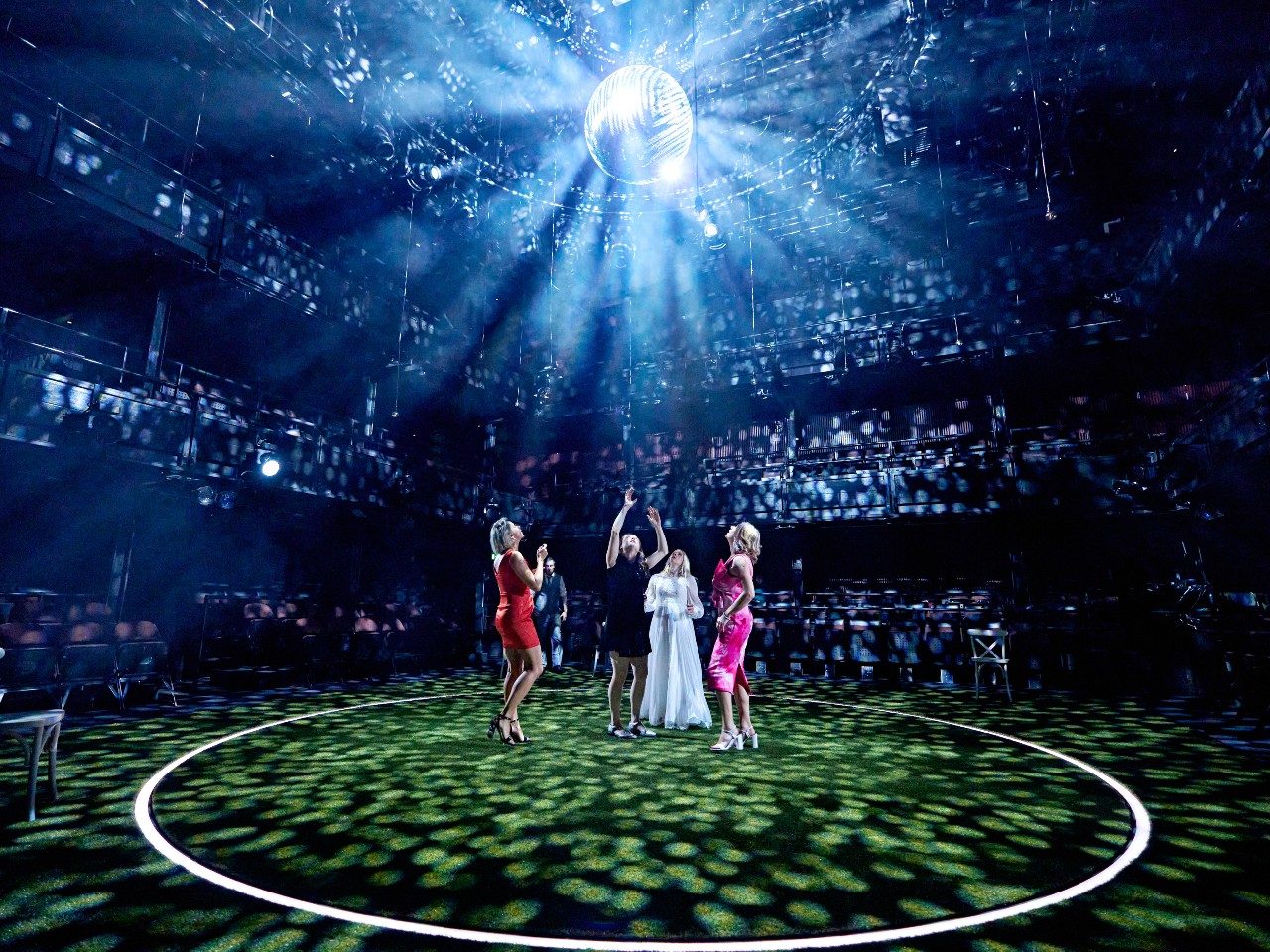
There was palpable excitement in the Dorfman Theatre, as audience members eagerly awaited Beth Steel’s newest play; Till the Stars Come Down. Above our heads, a suspended glitter ball, below a square of immaculate Astroturf, adorned with an illuminated white circle. Situated in the round, Till the Stars Come Down was set in the perfect location for this intimate, raw and tumultuous, modern day, Greek tragedy.
It’s Sylvia & Marek’s wedding day! The women of the family are preparing the nuptials accompanied by a beautiful violin underscore. Headed up by the formidable Hazel, the eldest sister, who adopts the matricidal role and is wound tighter than a screw. She is not shy in sharing her opinions, especially if they’re not warranted.
An array of household items are brought on to the stage – ranging from an ironing board, a make-up mirror and a tray of obligatory tea and biscuits. Maggie the prodigal daughter, tentatively returns for the big day – taking an interest in the couples future plans, whilst reminiscing with her sisters Hazel and Sylvia about good times and old lovers.
Hazel’s daughters Leanne and Sarah are physically present but have their own affairs to contend with. Leanne is in a relationship with her mobile phone; preoccupied with her own social anxiety and life’s all too predictable downward spiral. The more optimistic Sarah has her sights set on outer space and admonishing her relatives with pithy one liners.
Sylvia is torn between the magnitude of the day, her future with Marek and the dred in the pit of her stomach. A subtle resentment has grown between the sisters due to the obligations of the family: as putting one’s own dreams and desires before the family is frowned upon.
The stage is then animated by Aunty Carol, played by the magnificent Lorraine Ashbourne. She bursts into action like a Tasmanian Devil in a Cilla Black approved wedding hat. Ashbourne’s standout portrayal is a masterclass in acting. She embodies the immense range of the character: her struggle with ageing, the loss for her best friend, her desire for a man she could never have and the recognition of settling. Her comedic timing and physicality should be applauded.
Tony, (Dad) a perpetual singleton is lost to memory, he appears and disappears like the Ghost of Christmas Past. He feels the shift of his family changing and speaks to the ineffectiveness of a crumbling NHS. Aunty Carol agrees with his summation as she darkly jokes, “You couldn’t get an appointment if your kidney was hanging out”.
Till the Stars Come Down explores the economic demise, the political leanings, and the crushed spirit of a family stuck in an endless rut. Steel gives a voice to the men who have lost their livelihoods due to the closure of the local coalmines, and their families who are impacted as a result. Through her characters Tony, (the disillusioned patriarch), Uncle Pete (his embittered brother) and Hazel’s husband John (whose dreams were relinquished) we feel their heavy losses and hear their anguish. One out of many stand out scenes depicts Uncle Pete’s giving a toast at the wedding dinner. The toast is an acknowledgement of UK pit closures; a stoic listing of names in an obituary reading.
Steel paints incredibly vivid images with words, she is detailed and specific. Her character Marek, (Sylvia’s husband) is a representation of the many immigrates who through tenacity have built up their finances and made manifest their dreams. Steel comments on where racist ideas and policies can lead to, and how they in turn affect the daily lives of immigrates, who are blighted by emotional and physical violence.
Marek humorously recites the racist credo:
Their coming for your Country.
Their coming for your Jobs
and their coming for your WOMEN!
Sound familiar…Brexit or Boat Crisis anyone – take your pick
Samal Blak’s symbolically circular, revolving set is the visual container holding this pressure cooker, which is waiting to explode. The family is steeped in secrets, lies, guilt and shame; which all come to ahead in Act 2.
Aunty Carol and Maggie lament their life choices, John is hellbent in changing his life – whoever it may hurt, Uncle Pete can’t let go of past grievances, Hazel lives in fear of her future, Marek causes a rift, when he speak out about the racism he has encountered, and Leanne unleashes sheer drama upon the family, panicked by her world going up in flames.
Till the Stars Come Down displays razor sharp wit, a glorious use of metaphor and is brilliantly crafted. Steel is a juggernaut of a writer, whose fierce talent and characterisation engenders humanity, pathos, and precision.
Bijan Sheibani direction is beautifully seamless, meticulously considered and emotively driven.
The ensemble are exemplary, passionate, and committed. The echoes of the characters are still left within my viscera. I was floored by the text and the subsequent standing ovation was deservedly earned.
Run to see this powerful and evocative production.






























